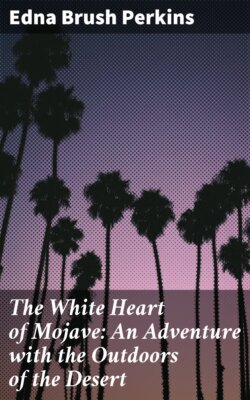Читать книгу The White Heart of Mojave: An Adventure with the Outdoors of the Desert - Edna Brush Perkins - Страница 7
На сайте Литреса книга снята с продажи.
III The White Heart
ОглавлениеTable of Contents
We had indeed found her. The morning sun came up over the immense valley ringed with beautiful, reposeful mountains. The big, empty mesas swept up to them, streaked with purple and green like the sea. Sometimes shining sand led between them to indistinguishable rose and blue. Such a palace of dreams beckoned toward Death Valley behind Avawatz, the sultry, red mountain that had been so magical in the night; and another called southward to the white desolation of the Devil's Playground beyond the far end of the lake where stood a symmetrical, black, mountain-mass with a tongue of bright sand running up it. The black mountain and the shining tongue of sand were reflected in an expanse of radiant blue water. This was astonishing and we hastened to inquire the name of the river or lake that lit the distance with such heavenly brightness. The old German chuckled so much that he seemed about to blow up with access of mirth. Finally he was able to explain that it was only a mirage. We watched it all day and saw it change to a thin streak at noon and widen again at evening. The reflections of the bushes at its edge were so magnified that they looked like trees. To Brauer's endless entertainment we insisted that trees grew there.
Ever since leaving Barstow we had been penetrating further and further into the Mojave. With every mile she had become more terrible and more beautiful. The colors which had delighted us at Joburg were pale beside the colors around Silver Lake, the mountains were hills compared to these beautiful, sinister masses. The sun had been brighter there than any eastern sun, here it was a hot, white blaze. All the way Mojave had asserted herself more and more. In the Imperial Valley, at Joburg and Barstow, we had felt men upon the desert, the drama was partly their drama; now, though they might still make roads and build houses, they seemed insignificant. We had but to walk two or three hundred yards from Silver Lake to forget it and be wrapped in the endless stillness. There was something awful in the silence, the awfulness which our savage ancestors felt and bequeathed to us in our intangible fear of the dark and of the wilderness, and the fear of being alone which many people have; but there was greatness in it too, the greatness which is always to be found in the outdoors. Balzac remarks that "the desert is God without humanity." Truly the earth lives, and the sun and the stars, a rhythm beats in them and unites them. They are the drama and the human story is only a scene.
The town of Silver Lake, such a little oasis of life in the solitude, is owned by the Brauers who operate a general store and give board to the few travelers who come to the mines in the neighborhood. They are mostly silver-mines, whence the name. A few years ago there was considerable activity when the Avawatz Crown and the big silver mine at Riggs were in operation. Miners came to "town" in Fords which no doubt resembled the junk pile we had followed from Joburg, and sometimes with pack-trains. The pack-train on the desert always consists of a string of burros. The burro in spite of his Mexican name, is nothing more than a donkey, the biblical ass. He seems to be native to all primitive places, the first burden-bearer. The prospector of the early days with his pick and shovel was a picturesque figure traveling across the sandy stretches from water-hole to water-hole. It is often a hard day's-journey between the infrequent springs, sometimes a several-days'-journey. He dug and broke the rock, and sometimes he made his "strike." Then the boom on the desert would begin. Settlers came in, roads were built and towns sprang up. The brutalities of mining-camps which we read of were probably reflections of the inhospitality of the land. The very characteristics which make the desert dramatic and beautiful make it terrible for mankind to overcome. The expense of mining operations in that hard country proved to be too great unless the vein were exceptionally rich, and most of the small mines are now abandoned. Nevertheless you still occasionally meet a prospector with his burros, and in remote places like Silver Lake the Ford has not entirely done away with the pack-train.
